A raccoon’s diet is composed of different kinds of foods. Furthermore, this animal is considered to share similar ancestry with bears because they both thrive in various natural environments except for the arid and desert-like ones.
What do raccoons eat in the wild? Raccoons are omnivores that consume a wide range of food, such as amphibians, reptiles, shellfish, birds, and insects. They also like fruits and vegetables. Since they eat almost everything, raccoons’ wild food depends on their instincts, season, and habitat.
There are other things behind the eating habits of raccoons in the wild. You’ll know them in this article. It’s also a way to better understand the lifestyle of these animals. So, continue reading.
What Do Wild Raccoons Like to Eat?
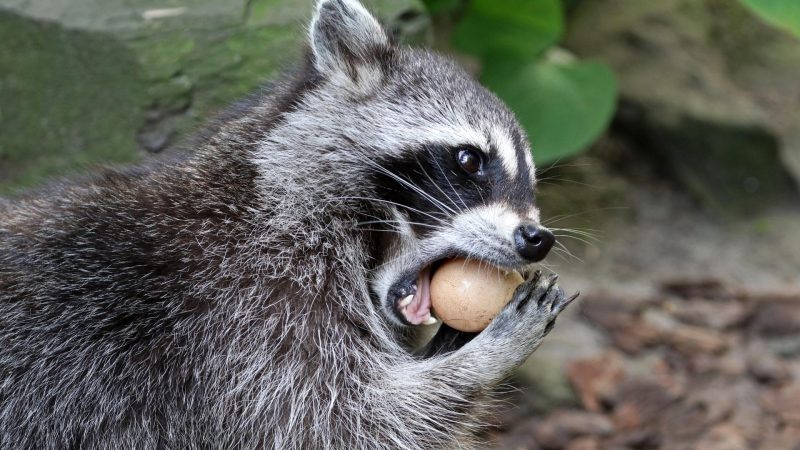
Raccoons like to eat aquatic animals the most like fish, clams, crayfish, snails, and frogs. Thus, they prefer to settle in areas close to a body of water.
Moreover, they like plant-derived foods. Raccoons’ favorites among the food varieties are berries, nuts, eggs, and insects. It’s a treat to them.
Are Bananas Safe for Raccoons?
Raccoons are considered backyard animals that love to eat bananas. Therefore, bananas are safe for raccoons.
Do Raccoons Eat Cats?
Raccoons sometimes catch and eat small animals like rabbits and chickens. At some point, you’ll see raccoons and cats eat together when the latter are being fed outdoors. While they contend with cats for the leftovers, they would prey on kittens.
What Do Baby Raccoons Eat Outside?
Mother raccoons work a lot to raise their baby raccoons. Milk is the primary food of the babies and they need to have it every four hours.
Thus, feeding is done five times a day. This routine compels a mother raccoon to stay in the nest and nurse her babies most of the time.
A mother raccoon takes care of the offspring by herself. Baby raccoons can have solid food when they’re around six weeks. Berries, nuts, insects, fish, and frogs are the foods that are first presented to them.
The introduction of solid food usually lasts for a few weeks. Since they’re adaptable animals, they become independent in a short span.
Is It Bad to Feed Wild Raccoons?
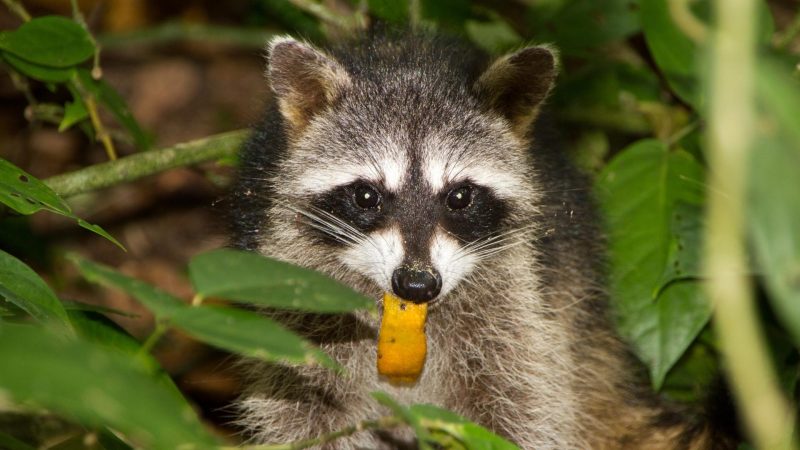
Feeding wild raccoons is bad because it will encourage them to habituate your place or property. By doing so, they become dependent on a certain food source.
When raccoons frequently get close to humans, pressure and strain accumulate. The consequences are a high risk of accidents and intensifying their aggression.
What Do Raccoons Hate?
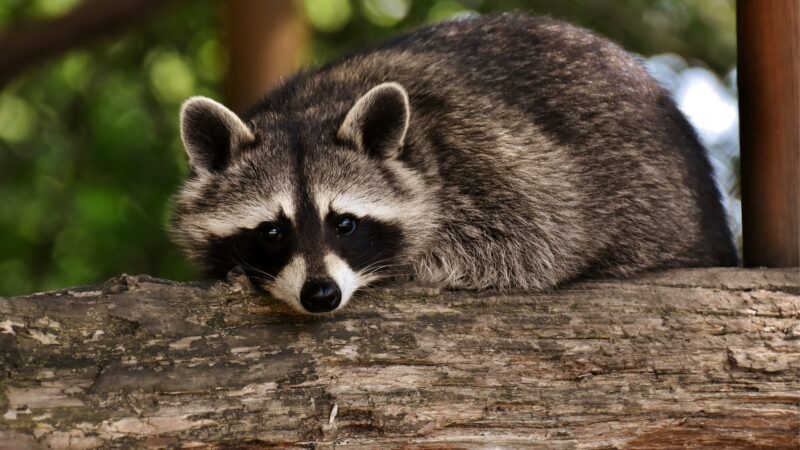
- Bright lights – Raccoons are nocturnal, and they hate bright lights as it shines like broad daylight.
- Hot pepper – The potent smell of hot pepper irritates a raccoon’s nose. It’s the best deterrent as they will stop what they do and leave once they smell it.
- Pepper and onion – Boiling pepper and onion together give off a scent that raccoons hate as this combination bothers their nose. It’s stronger than a hot pepper.
- Peppermint essential oil – Critters like raccoons hate the smell of peppermint. There are peppermint wildlife sprays like Natural Armor and Rodent Sheriff besides the essential oil.
- Epsom salt – What raccoons hate about is also its scent. Since they don’t like it, they tend to run away from it.
- Predator urine – Not all the scents that raccoons hate irritate their sense of smell. For instance, the predator’s urine doesn’t bother their noses at all. Instead, it gives them the idea that the location is occupied by a predator. So, they’re not comfortable being in a place that is the territory of another animal.
Related: What Scent Will Keep Raccoons Away? | Information & Facts
What Foods Are Toxic to Raccoons?
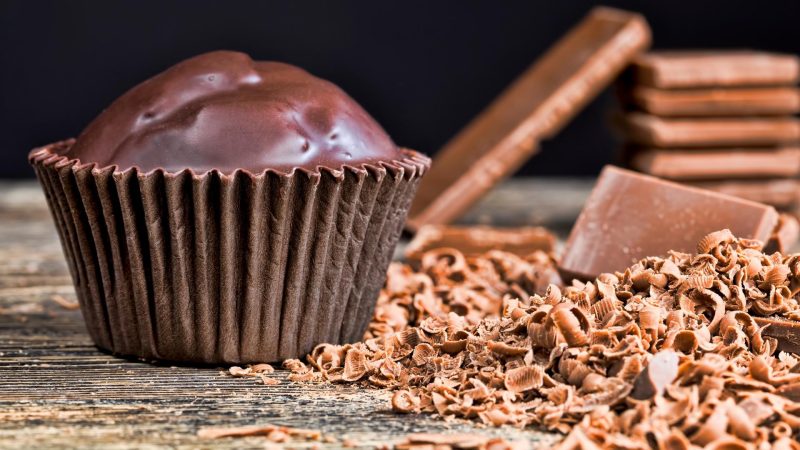
Chocolate, Cocoa, or Coffee
These foods contain caffeine and theobromine that affect raccoons’ nervous systems. They can make raccoons aggressive, hyperactive, and irritable. Symptoms include diarrhea, vomiting, seizures, and heightened heart rate. It can also lead to death.
Onions and Spices
Onions have sulfoxides and disulfides, which affect the red blood cells of raccoons by causing anemia. Other kinds of spices are harmful to raccoons too, whether in fresh form, mixed with other foods, or processed.
Avocados
Avocados give them nauseous feelings, diarrhea, and heart congestion.
Candies, Chips, and Processed Sugar
Candies and gums contain xylitol which can make raccoons vomit and lose coordination. This substance also causes seizures and liver problems. A complex sugar found in sodas or artificial beverages can impair the hormonal and digestive systems of raccoons.
Chips, biscuits, and cookies have contents that are harmful such as complex sugar and even preservatives like onion and garlic powder.
Raisins and Macadamia Nuts
These foods are highly toxic to raccoons.
Cow’s Milk
The Vitamin D found in cow’s milk is not favorable to raccoons. When they drink it, they can get indigestion and other digestive troubles.
Bread
It’s only toxic to raccoons if they have fungal infections because of the presence of yeast in bread.
How You Can Keep Food Away From Raccoons?
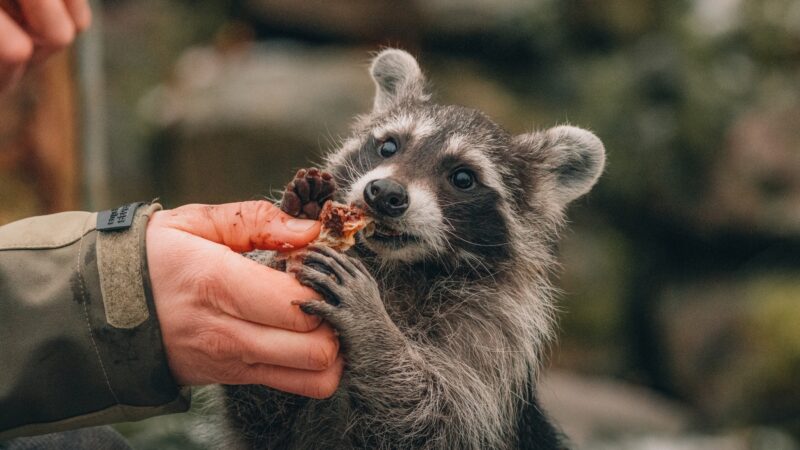
Securing the Trash Can
There are several ways how to drive away raccoons from your house. But, it’s best to focus on how you dispose of your trash that contains food.
Start by getting repellent trash bags like Mint-X Trash Bags and .
They can keep leftovers and scraps from the kitchen unmoved by maintaining the surroundings fresh and clean. So, raccoons won’t notice them.
Use trash cans that are heavy and durable enough to counter the pilfering of raccoons. Make sure that there are lids with a lock or clip. The cans should be placed on even ground so they won’t tip over.
Have your garbage collected in the morning instead of the nighttime when raccoons are out hunting food.
Removing Food Source
If you grow crops and fruits outside, make sure that you pick the fallen fruits in the ground. Once raccoons see them scattered everywhere, they become eager to get into your yard.
When you leave your pets outdoors, it’s best to have their feeding bowls inside your house. The mealtime should also be indoors so raccoons won’t have a chance to share the meal.
What Eats a Raccoon?
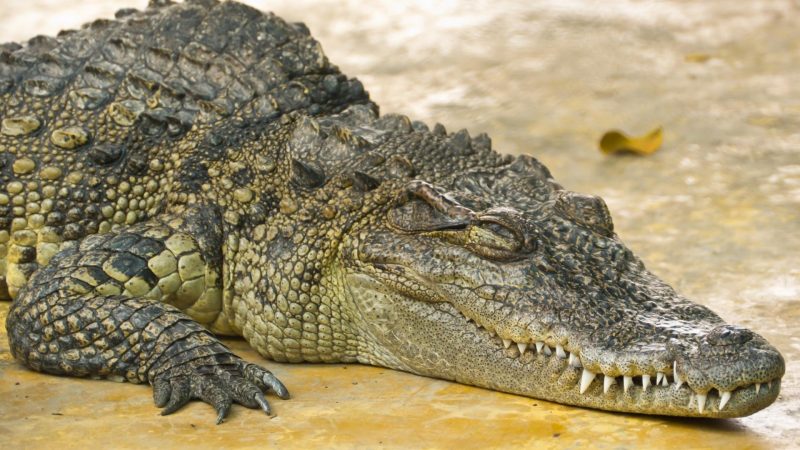
Crocodiles, reptiles, bobcats, wolves, coyotes, cougars, and avians eat raccoons.
Do Raccoons Do Anything Good?
Raccoons almost eat everything including plants. The good point in this matter is that they help spread seeds that can grow into plants.
They do it everywhere as they go 10 miles to search for food. Since these animals are diggers, they do soil turn-over that improves aeration, which quickens decomposition and promotes plant recruitment.
Believe it or not, raccoons protect bees. These buzzing insects are the world’s first pollinators that help plants flourish.
Wasps tend to colonize the bee’s territory. Raccoons can prevent this incident by consuming wasp larvae. Thus, they lower the number of wasps that can attack bees.
Raccoons are known as scavengers, so they eat carrions as well. This means that they help clean the ecosystem.
Being in the middle of the food chain, they can be both predators and prey. Moreover, they contribute to the balance of the ecosystem.
They prey on parasitic species that cause problems in gardens and farms. After some of them are eaten by raccoons, their number won’t be out of control. However, raccoons also perish when consumed by a predator.
Why Raccoons Are Bad Pets?
Raccoons are bad pets because apart from being unpredictable, they require high maintenance. They need a lot of space as they’re active.
Additionally, they can damage your belongings and house any time of the day. Thus, you have to commit a lot of effort and time to their health issues and dietary needs.
Related: Why You Should Not Have a Raccoon as a Pet? | Reasons You Need to Know!
Can Raccoons Be Tamed?
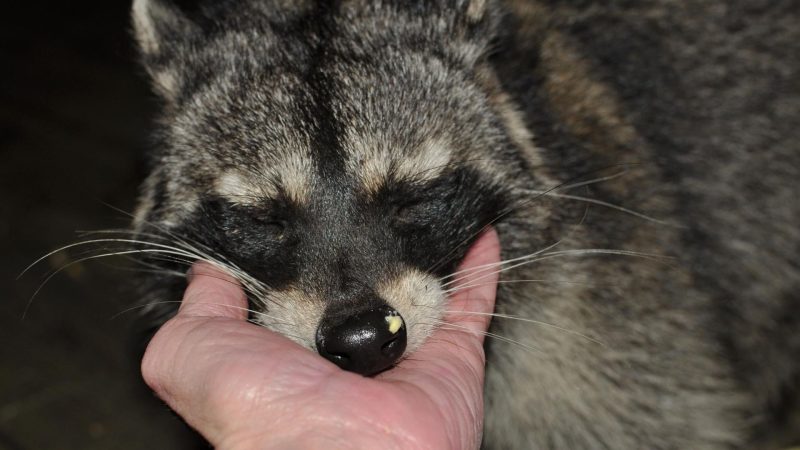
It’s difficult to tame raccoons as they turn into notorious biters when bothered. But if you can put up with them with enough knowledge of their behavior, you’ll find them funny and fascinating.
List of Sources
Raccoon. State University of New York College of Environmental Science and Forestry.
Baldwin, R. A. (2014). Raccoons. University of California Agriculture & Natural Resources.
Raccoon. Indiana Department of Natural Resources.
- How to Get Rid of Copperheads | Practical Guide - August 27, 2023
- How to Get Rid of Corn Snakes | What Makes Them Aggressive? - August 27, 2023
- How to Get Rid of Alligators | Safety Measures and Removal Methods - July 16, 2023
